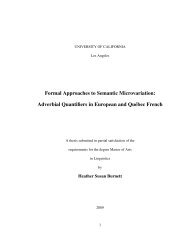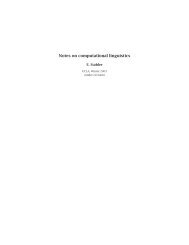Post Verbal Subjects and Agreement in Brazilian Portuguese
Post Verbal Subjects and Agreement in Brazilian Portuguese
Post Verbal Subjects and Agreement in Brazilian Portuguese
You also want an ePaper? Increase the reach of your titles
YUMPU automatically turns print PDFs into web optimized ePapers that Google loves.
(81) a. [ SC [as men<strong>in</strong>as] [ o problema] ]<br />
b. [ vP [o problema] i be j [ VP t j [ SC [as men<strong>in</strong>as] t i ]<br />
c. [ TP [as men<strong>in</strong>as] k foram j [ vP t k [o problema] i [ VP t j [ SC t k t i]<br />
Alternatively, the subject may stay with<strong>in</strong> the vP, while the predicate DP<br />
raises to spec-TP, trigger<strong>in</strong>g predicate agreement. This is parallel to those VS cases<br />
where pro-there raises to spec-TP:<br />
(82) a. [ SC [as men<strong>in</strong>as] [ [o problema] k ] ]<br />
b. [ vP [as men<strong>in</strong>as] i be j [ VP t j [ SC t i [o problema] k ]<br />
c. [ TP [o problema] k foi j [ vP t k [as men<strong>in</strong>as] i t j [ VP t j [ SC t i t k]]<br />
This addresses two of the cases seen with existentials <strong>and</strong> unaccusatives. We<br />
are miss<strong>in</strong>g the case where verb agreement on unaccusatives <strong>and</strong> existentials is third<br />
person s<strong>in</strong>gular after rais<strong>in</strong>g of the pro-il expletive to spec-TP. This does not seem<br />
to be possible <strong>in</strong> the case of copular sentences:<br />
(83) *foi as men<strong>in</strong>as o problema. 22<br />
was the girls the problem.<br />
‘the girls where the problem’ (lit: *it was the girls the problem.)<br />
Given that I am propos<strong>in</strong>g a s<strong>in</strong>gle analysis for the three constructions, this<br />
needs to be expla<strong>in</strong>ed. I propose that this can be done by assum<strong>in</strong>g that one <strong>and</strong><br />
only one DP can be licensed for case <strong>in</strong>side the vP. There have been a number of<br />
proposals for the availability of case mark<strong>in</strong>g <strong>in</strong> a verb-<strong>in</strong>ternal postion <strong>in</strong><br />
existentials <strong>and</strong> unaccusatives, account<strong>in</strong>g for check<strong>in</strong>g of post-verbal subjects (e.g.,<br />
22 This sentence is possible <strong>in</strong> marked contexts, where there is constrastive focus on as men<strong>in</strong>as. This<br />
is not the same distribution as the other cases of <strong>in</strong>verted copulars discussed <strong>in</strong> this paper. For a<br />
discussion of contrastive focus <strong>and</strong> VS order <strong>in</strong> other verbs, see section 2.1.<br />
28

















